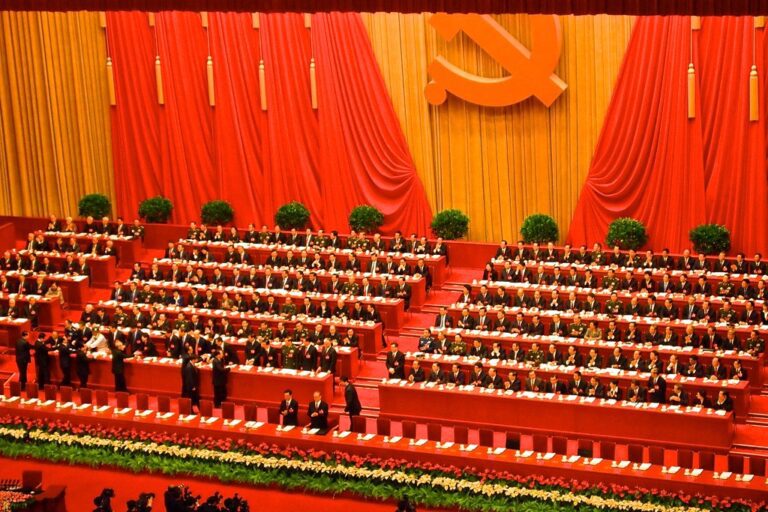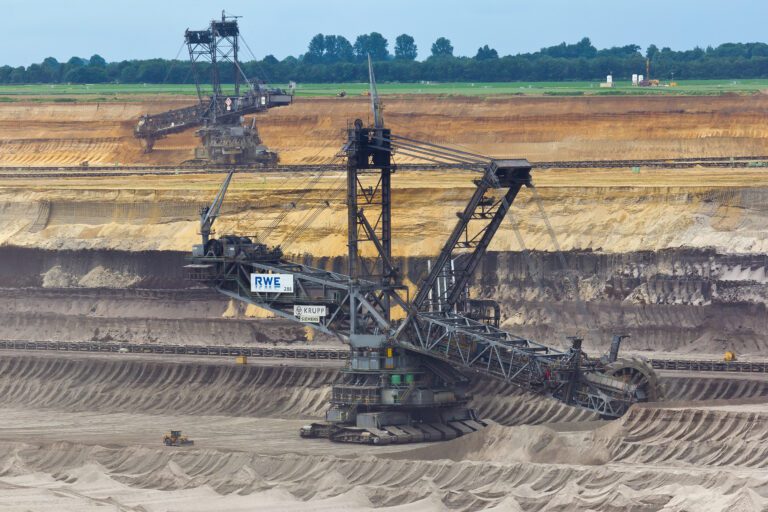
The Russian invasion of Ukraine is shaking up the very foundations of the international system, making crucial multilateral and plurilateral fora such as the G20 nonfunctional in tackling continuing fundamental crises, including climate change. China’s position towards the conflict has been closely watched by the global community. Yet, Beijing has been threading the needle and has, thus far, shied away from taking a proactive stance.
In this context, the G7 becomes an even more relevant venue to provide solutions for the mounting crises that are following the invasion and, inevitably, engaging China on this – with Germany holding a special role as the G7 presidency.
Recently, the winds have changed in Germany’s relations with China. The German coalition agreement that now underpins the Olaf Scholz-led government paints a clear picture of a departure from former Chancellor Angela Merkel’s pragmatic, economics-focused approach to a tougher, geopolitically considered stance. The agreement reflects political shifts and new power dynamics that have emerged over the last years, explicitly referring to competition and “systemic rivalry” in Sino-German relations.
These signs of a paradigm shift are aligned with the new government’s wider aim to pursue a more assertive, value-based foreign policy where issues like climate change take center stage in Germany’s view of international relations. During this year’s G7 presidency, Germany has the opportunity to facilitate the development of a new more effective approach towards China across G7 countries with climate at the heart of this united effort.
China Can Make or Break Global Climate Outcomes in 2022
There is no credible pathway to limiting global warming to safe levels without climate action by China, the world’s largest greenhouse gas emitter.
While China has stepped up its ambition following new climate targets announced by Xi Jinping in 2020, the country’s current emissions trajectory is far from being aligned with the Paris Agreement. At the same time, China is a market leader in many green sectors and influences third countries’ development pathways through global investment. Therefore, engaging China on climate is key to securing a pathway that keeps global warming to 1.5°C above pre-industrial levels and prevents the most devastating impacts from climate change.
Yet, declining trust in multilateralism and increasing geopolitical tensions between China, Russia, and the West will likely limit the space for meaningful climate diplomacy in 2022 and create a challenging geopolitical and geoeconomic context for the G7.
As cooperation is becoming increasingly difficult, however, competition with China in the climate sphere and global infrastructure investment can actually open new avenues of opportunity. Last year’s concerted G7 effort to phase out international coal finance left China isolated as the last remaining funder. This paved the way for Xi’s announcement to phase out international coal investment and to step-up support for renewables in developing countries. Similarly, China’s global infrastructure investment is prompting the G7 to look at their own avenues for mobilizing finance at the scale required for meeting development needs and tackling climate change, resulting in new initiatives such as the Build Back Better World, the Clean Green Initiative, and Global Gateway.
A new approach is needed that shapes the right environment for China to step up its ambition. To reap the benefits of the right balance of competition and cooperation, close coordination and aligned messaging among the G7 is key.
A Paradigm Shift in Germany’s China Policy
Germany and the wider EU’s relations towards China have been impacted by the sanctions row over Xinjiang, China’s economic coercion towards Lithuania, and its ambiguous stance or even implicit support for Russia over the war in Ukraine. The Russian invasion is resulting in a fundamental shift in Germany away from the long-held “Wandel durch Handel” doctrine, which will change the way how German policymakers will design China policies moving forward. The war is also changing the broader EU foreign and security policy, which will shake up the way Europe thinks about its relations with China. While a more unified position within the EU towards China is shaping up, a clear strategy for China engagement is still missing.
Climate has long been seen as the “oasis in the desert,” which allowed space for cooperation despite growing divisions. However, tensions between the West and China are beginning to spill over into the climate space with the controversy over Brussels’ plan to introduce a Carbon Border Adjustment Mechanism (CBAM) and Washington’s actions to restrict Chinese imports, which included solar panels from Xinjiang, over alleged human rights abuses. The EU-US initiative to forge a green steel club, Brussels’ new legislation on batteries, and Germany’s plan to pursue an international climate club with the G7 nations might add new flashpoints to climate diplomacy in 2022 and will test Germany’s and the EU’s ability to act collectively and decisively on the world stage.
With the new German government and G7 presidency, the climate is coming to the center stage of foreign policy and will be underlying all areas that are shaping up as key issues following the Russian invasion, including security, energy, and food supply. The governing parties are well aware that managing tensions with China and fighting climate change must be part of the same conversation. The new government made clear that it is serious about developing a strong and joined-up climate foreign policy and that climate must sit at the heart of all bilateral and multilateral relations.
Germany’s China policy over the past decade has, to a great extent, shaped the EU’s approach as well. Now, the nation’s leadership will inevitably inform the G7’s China engagement on a larger scale. Consequently, formulating both the climate foreign policy and the new German China strategy while taking these new realities into account will be crucial at a time when Europe’s approach to China is in considerable flux. Making climate a central feature in Germany’s China policy, a strategy laid out by Foreign Minister Annalena Baerbock, will give Germany a chance to use this year’s G7 sensibly to carefully craft its strategic agenda and achieve the most ambitious climate action from China possible.
Key Recommendations for the German G7 Presidency
Going forward, the new German government needs to develop a strategic approach towards China that seeks cooperation where possible while making use of competition dynamics to advance climate action globally. To create the right environment for China to step up its climate action in line with the Paris Agreement, the German G7 Presidency needs to deliver on four key actions.
First, close alignment between the G7 to walk the talk is needed. The world’s most economically advanced nations must lead by example on their climate ambition and implementation of the Glasgow Climate Pact in order for others, including China, to feel the heat and follow suit. This includes clarifying the 1.5°C alignment of their nationally determined contribution ahead of COP27, speeding up coal and fossil subsidies phase-out, and showing how this can be achieved through a fair and just transition. In light of the Russian invasion of Ukraine, Germany and the G7 need to show that their energy policies are shifting clearly towards renewables rather than backtracking towards more reliance on other fossil fuels such as coal.
Second, the G7 will be required to carefully manage climate tensions with China. Germany has put forward the idea of a climate club and made its development a central priority for its G7 presidency. Meanwhile, the EU is progressing on the development of a CBAM as similar discussions emerge in the US. It will be crucial for these initiatives to be framed as open and inclusive. This will enable the West to manage the tensions with China, while at the same time providing incentives, including offering support, for climate-progressive developing countries to join. An inclusive architecture provides an opportunity to accelerate the decarbonization in developing countries rather than providing a new source of tensions that undermine international climate governance.
Third, the G7 need to step up and deliver on infrastructure investment and energy transition partnerships. It is crucial that the group closely align diverse initiatives to deliver credible, attractive offers on infrastructure and energy transition investments to emerging economies and major emitters that are backed by financial firepower. The first delivery on this will be the successful execution of the Just Energy Transition Partnership with South Africa. Germany and its partners must avoid any risk that these investments are led by pure geopolitical interests without taking recipient countries’ needs into account. If China is serious about halting overseas financing of coal power and a stronger “green” focus for the BRI, opportunities for coordination with China on related initiatives should be considered to increase and improve finance for the clean transition in recipient countries.
Fourth, to re-establish trust and credibility, Germany and other developed countries need to deliver on their pledges on finance and vaccine delivery. Declining trust between developed and developing countries has been a key hurdle for moving the focus towards major emitters. To rebuild this trust, the G7 must deliver on the $100 billion pledge in climate finance and prepare a structured framework for how this can increase further. Moreover, developed countries need to deliver vaccines to fight the pandemic and offer economic and fiscal support through increasing reallocation of Special Drawing Rights (SDR) under the International Monetary Fund. Ensuring food security in developing countries will become another crucial issue this year, as food prices are expected to rocket following the war in Ukraine.
Germany’s G7 presidency will be the early litmus test for the engagement with China on climate. In the current environment marked by crises that can only be worsened through climate impacts, it will be even more crucial for the G7 to find the right approach towards China by bearing the five actions points above in mind to achieve the most impactful climate action possible that keeps 1.5°C within reach.
Written by
Belinda Schäpe
BelindaSchaepeBelinda Schäpe is a Climate Diplomacy Researcher on EU-China relations at E3G. Prior to joining E3G, Belinda worked as a Blue Book Trainee at the European Commission on the EU’s international transport relations, especially in relation to China.
Jule Könneke
julekoennekeJule Könneke is a Climate Diplomacy Researcher in E3G’s Geopolitics, Diplomacy and Security team. Before joining E3G, Jule worked on international climate politics in GIZ’s Support Project for the Implementation of the Paris Agreement and held positions at the Federal Foreign Office, Forum Transregionale Studien, Körber Foundation and the German Council on Foreign Relations (DGAP).


